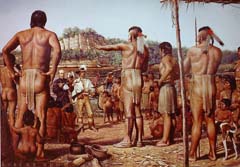
 |
The French (1673-1763)
French traders exchanging European goods for furs obtained by their American Indian trading partners. (decorative detail from a map by William Faden, 1777) |
The Illinois are much less barbarous than other Savages; Christianity and intercourse with the French have by degrees civilized them. (Gabriel Marest, 1712)![]()
French fur traders, missionaries, and colonists had a strong impact on the way of life of the Illinois Indians during the ninety-year period of French control in the Illinois Country. The French had a much different belief system, economy, and technology than the Indians, and they arrogantly tried to "improve" the Illinois by making them more like themselves. The French also brought with them a long history of military conflicts with the British and a host of European diseases to which the Illinois had no immunity. Although the French maintained a peaceful relationship with the Illinois, under their influence the health and traditional culture of the Illinois Indians steadily declined.
![]()
Arrival of Marquette and Jolliet at the Grand Village of the Kaskaskia, 1673. (painting by Robert A. Thom, 1967)
The French presence in the Illinois Country began in 1673, when Jacques Marquette, a Jesuit priest, and Louis Jolliet, a fur trader, became the first Europeans in recorded history to explore the upper Mississippi River. The explorers visited two Illinois villages: a Peoria village near the Mississippi River and a Kaskaskia village on the upper Illinois River. Marquette returned to the Kaskaskia village two years later and established the first Catholic mission in the Illinois Country: the Mission of the Immaculate Conception of the Blessed Virgin. Missions were later established at other Illinois villages, as the Jesuits and other religious orders converted many of the Illinois people to Christianity.
![]()
Fort de Chartes on the Mississippi River
Along with the missions came French trading posts, established by fur traders who offered European trade goods in exchange for bison hides and beaver pelts. In the late 1600s, the French established Fort Chicago on the shore of Lake Michigan, Fort St. Louis near a Kaskaskia village on the upper Illinois River, and several forts located near Peoria Indian villages at Lake Peoria (Pimetoui) along the central Illinois River (Fort Crévecoeur and Fort St. Louis II). Other posts sprang up in the 1700s. The most important of these was Fort de Chartres, which was located on the Mississippi River near villages of French colonists and the Kaskaskia and Michigamea Indians. Bartering at trading posts changed the traditional economy and technology of the Illinois people and made them dependent upon the French.
![]()
French forces and their Indian allies attacking General William Braddock's English army in western Pennsylvania during the French and Indian War, 1755.
The French also introduced security problems for the Illinois stemming from an ongoing military struggle between France and Great Britain. Britain established colonies on the Atlantic seaboard in the early 1600s, and conflicts arose as settlement expanded westward toward French claims in the Ohio Valley. These conflicts erupted in the French and Indian War (1754-1760), in which the French and British armies fought one another with the assistance of American Indian warriors from different tribes. The Illinois were faithful allies of the French in these battles, while many other tribes, including the Chickasaw, Fox (Mesquakie), and Miami, sided with the British. Great Britain won the war and, under terms of the 1763 Treaty of Paris, seized control of lands east of the Mississippi River. Meanwhile, a secret treaty signed in 1762 conveyed lands west of the Mississippi from France to Spain.
Epidemic diseases introduced by the French and other white settlers caused numerous deaths among the Illinois Indians. Many children became ill and died in the winter of 1692-1693 from a disease that has not been identified. This was followed by a smallpox epidemic in 1704, a possible measles outbreak in 1714 that killed 200 Kaskaskia Indians, and additional smallpox epidemics in 1732 and 1756. Disease and warfare caused a massive decline in population among the Illinois.![]()
|
|
Copyright © 2000 Illinois State Museum


